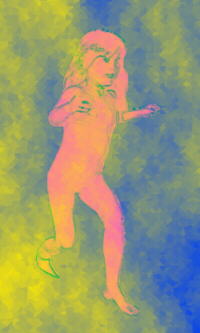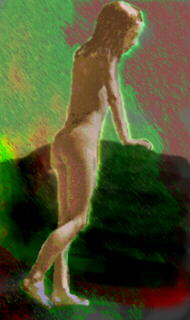Joy
"The smallest of children live in the glow of joy because they trust in the life they've been given."

"When we clothe ourselves and banish our basic humanity to an oblivion of forgetfulness, we have cut ourselves off from much of our joy."

In the artlessness of a child's mind, life is as mysterious and elusive as it is for the wisest of sages. For the child, however, the experience itself is what matters most -- not the way in which it came about. Children may have goals and they may scheme to attain things that they think will give them pleasure. But it is in the spontaneous moment that they find the joy they seek. While they gradually adapt to the plotting ways of adulthood, they can still let go and simply live.
The smallest of children live in the glow of joy because they trust in the life they've been given. They let responsibilities and concerns fall into the laps of adults and only worry when it dawns on them that a beloved parent is mortal and may disappear from their lives. This is not to say that a child's life is one of endless bliss. Perhaps it is better understood as one where life can be lived in the moment to it's fullest -- whether in pleasure or pain. And while in our youngest years we flexibly move from pole to pole with little anxiety as to how long it will last or when we shall have it again, time eventually burdens us with a sense of these things. We become all too aware of the consequences or our actions and the formulas by which we may attain the things which in the past have given us pleasure.
Caught up in the churning of such considerations, the clarity and beauty of simply being becomes shrouded in layers of speculation and conjecture. The joy of just being becomes the satisfaction of watching the well-designed machinations of our lifelong plans ratchet through their motions. Ideas and feelings are appropriately compartmentalized and desires dutifully deferred until the optimum instant. Joy is then not an experience that flows easily from one moment to the next but a discrete package of complacency yielded to us by a begrudging world as a well-earned reward.
Setting ourselves and our time apart we lose the continuity and vital sense of connection. There is a time and place for everything, and enjoyment exists quite apart from the struggles of our labor. Through all this our basic needs are bound up in the packaging and put into boxes to be opened when its more convenient. Our extraneous senses -- those feelings which are not necessary to the accomplishment of our goals -- are not simply of no use but actually interfere with our efforts. We must learn to put them aside and out of sight lest the distract us and throw us off our timetable.
The body, however, is more than a tool. It is an integrated part of what we are -- inseparable and absolutely essential. If we ignore it or shun it because it doesn't fit in with the plan we deprive ourselves of something which in the end we cannot do without if we really hope to experience the fullness of what life has to offer. When we clothe ourselves and banish our basic humanity to an oblivion of forgetfulness, we have cut ourselves off from much of our joy. We have divided ourselves into parts that we may show the world and parts that we may not. And through this fragmentation we cripple ourselves and cease to be the sum of all those different aspects.
Perhaps it is best to think of joy as a kind of nakedness of the spirit when the sunlight and authenticity of our world can touch us without fear and apprehension. To denude ourselves of the trappings of our minds and thoughts allows us to really feel things more directly and take in the nourishment of the true nature of things. And in many ways joy can also be seen as the childhood of the soul when it is permitted to bask in the glow of its very innocence and expand beyond the confining boundaries imposed by our limited ideas. It is through joy that we embrace life rather than shrink away from it. It is through joy that we remove the barriers to the fullness with which anxiety and despair enshroud us.
Nakedness may be seen as merely a metaphor in that sense, but it may be wiser to appreciate that the physical state of being -- the acceptance of ourselves in our totality -- is a necessary component in our spiritual and mental growth. To be capable of such growth we must remain in a state of naked childhood -- open, trusting and even vulnerable in many ways. We can look to the youngest members of our world to teach us these lessons which too many of us seem to have forgotten. We have too easily accepted that because there are hazards in the world we must remain perpetually focused on those dangers, not realizing that in the process we are damaged in ways that are more debilitating than whatever we tried to avoid.
Even if our hearts have closed themselves off and we have lost the spark, we can regain it if we give ourselves the chance. It's just a matter of letting go and releasing the fear that holds us prisoner. The truth is we must become as children again -- we must shed the literal and figurative clothing of our grim, serious lives and melt carelessly into the ocean of life which surrounds us. That is the way to joy and the way to living life as it was meant to be lived -- as we were born to it.